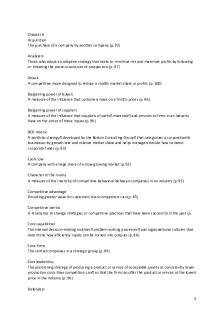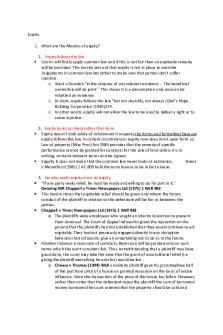The Moorcock - Exams Notes PDF

| Title | The Moorcock - Exams Notes |
|---|---|
| Course | English Law Of Contract And Restitution |
| Institution | University of Strathclyde |
| Pages | 2 |
| File Size | 53.7 KB |
| File Type | |
| Total Downloads | 100 |
| Total Views | 168 |
Summary
Exams Notes...
Description
“The Moorcock” (1889) 14 PD 64 Judges: Lord Esher, M.R. ; Bowen, L.J.; Fry, L.J. Defendants (appellants): wharfingers Plaintiff (respondent): owner of the steamship Moorcock Date: Feb 23,25 1889 Court: Court of Appeal (I couldn’t find the previous court on the casebook) What happened: In Nov, 1887, there was an agreement between the both parties that the vessel should be discharged and loaded at the wharf, and should be moored alongside the jetty. Both parties were aware of the fact that the vessel would take the ground at low water. The tide ebbed and the Moorcock sustained damage. Butt, J (previous court judge) held that the defendants were liable due to the fact that the premises (wharf) of the defendant under the circumstances could not be used without the vessel grounding, therefore the defendant must be deemed to have impliedly represented that they had taken responsible care to ascertain the bottom of the river adjoining the wharf was in a condition as not to cause injury to the vessel. Defendants appealed, appeal dismissed.
Appellants’ argument (wharfingers): 1. The owners of the jetty are not bound to ascertain the state of the bed of the river or to repair it. The only duty cast upon them is not to allow the vessel to come there if there was a trap. (Reg v Williams) 2. Had no reasons to think the place was not suitable for the vessel, as there was another vessel of fully the same length lying safely at the jetty. 3. The soil of the bed of the river was vested to Thames Conservancy, the owner of the jetty is only a licensee of the Thames Conservancy. There was no implied warranty that this was a safe berth for the vessel to lie in/ no implied representation that care had been taken to ascertain the condition of the river bed at the jetty.
Respondents’ argument (owner of the steamship Moorcock): 1. Jetty could not be used without a vessel lying at it grounding at low water,
therefore implying part of the contract is that the owner of the jetty had taken care to ascertain the bed of the river adjoining the jetty is reasonably safe for the vessel to lie on/ to warn the ship owner that the bed of the river is not safe. (White v Phillips)
Judges’ decisions: Lord Esher, M.R.: 1. An honest business between the appellants and the respondent cannot be carried on unless the appellants had impliedly undertaken some duty towards the respondent 2. The least that can be implied as appellants’ duty (and least onerous) is to take reasonable care to find out in what condition the bottom is, because they can find out the state of the bottom of the river close to the front of their wharf without difficulty. They then have to make the bottom of the river fit for purpose/ inform the other party it isn’t safe. Bowen, L.J.: 1. Main question of the case: whether a contract is made to let the use of this jetty to a ship which can only use it by taking the ground, there is an implied warranty. If yes, what the extent of the warranty is. 2. Both parties must have known that unless the ground was safe, the ship would be simply buying an opportunity of danger, therefore all consideration would fail unless some care had been taken to see that the ground was safe. 3. With regard of the condition of the river outside the jetty, the ship owner knows nothing, and the jetty owner might with reasonable care know everything. 4. Although the soil of the river bed adjoining the jetty doesn’t belong to the owner of the jetty, they still have the duty to know that the jetty cannot be used unless reasonable care is taken, if not to make it safe, at all events see whether it is safe. Fry, L.J.: 1. Conservators were under no obligation to fix the river bed. 2. Defendants had the mean to examine the bottom of the river and neglected to do so....
Similar Free PDFs

The Moorcock - Exams Notes
- 2 Pages

CRPC Notes for Exams
- 117 Pages

Coownership Notes FOR Exams
- 16 Pages

Past Exams at the ANU
- 4 Pages

Biology exams - Notes and Test
- 32 Pages

Gibson v MCC - Exams Notes
- 3 Pages

ACCA-SBL-Notes-Sept19-Exams Open Tuition
- 230 Pages

ACCA APM Notes September 2019 Exams
- 190 Pages

ACCA AFM Notes September 2019 Exams
- 146 Pages
Popular Institutions
- Tinajero National High School - Annex
- Politeknik Caltex Riau
- Yokohama City University
- SGT University
- University of Al-Qadisiyah
- Divine Word College of Vigan
- Techniek College Rotterdam
- Universidade de Santiago
- Universiti Teknologi MARA Cawangan Johor Kampus Pasir Gudang
- Poltekkes Kemenkes Yogyakarta
- Baguio City National High School
- Colegio san marcos
- preparatoria uno
- Centro de Bachillerato Tecnológico Industrial y de Servicios No. 107
- Dalian Maritime University
- Quang Trung Secondary School
- Colegio Tecnológico en Informática
- Corporación Regional de Educación Superior
- Grupo CEDVA
- Dar Al Uloom University
- Centro de Estudios Preuniversitarios de la Universidad Nacional de Ingeniería
- 上智大学
- Aakash International School, Nuna Majara
- San Felipe Neri Catholic School
- Kang Chiao International School - New Taipei City
- Misamis Occidental National High School
- Institución Educativa Escuela Normal Juan Ladrilleros
- Kolehiyo ng Pantukan
- Batanes State College
- Instituto Continental
- Sekolah Menengah Kejuruan Kesehatan Kaltara (Tarakan)
- Colegio de La Inmaculada Concepcion - Cebu






